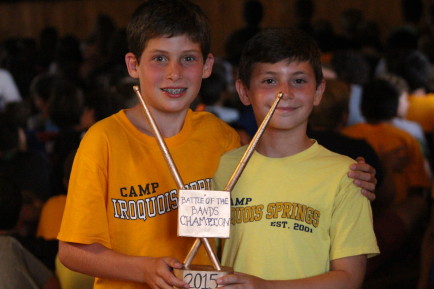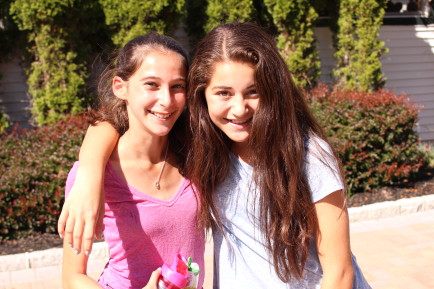Happiness and Well Being
 If you ask any parent what they want most for their kids, they would probably say they want them to be happy. To live a life surrounded by good friends, dreams to pursue, accomplishments to be proud of, and overall well being. Happiness is not something that just happens by luck, but can be modeled and strengthened with practice. That is probably why so many parents choose to send their kids to sleepaway camp. They know the value of a camp experience that allows kids to develop social connections, challenge themselves to achieve personal goals, and spend their days in a positive environment being physically active and healthy, surrounded by habits of happiness.
If you ask any parent what they want most for their kids, they would probably say they want them to be happy. To live a life surrounded by good friends, dreams to pursue, accomplishments to be proud of, and overall well being. Happiness is not something that just happens by luck, but can be modeled and strengthened with practice. That is probably why so many parents choose to send their kids to sleepaway camp. They know the value of a camp experience that allows kids to develop social connections, challenge themselves to achieve personal goals, and spend their days in a positive environment being physically active and healthy, surrounded by habits of happiness.
Research all points to the belief that happiness matters. Happiness is good for our health and relationships. Happy people are more generous, cope better with stress and are better able to see the big picture. Even though what brings someone happiness is an individual thing, research shows that happy people are more satisfied with all aspects of life. It could be watching a beautiful sunset, spending time with the people you love, helping someone out in a time of need, or achieving a personal goal. Whatever it is that makes a person happy, the benefits are plentiful.
There is even an International Day of Happiness. The United Nations declared March 20th the International Day of Happiness to recognize the relevance of happiness and well being as universal goals. The goal of creating a happier world together sounds pretty good and very worthwhile.
So what can we do to raise happy kids? The following are some great ways to start!
Build Relationships. Sonja Lyubomirsky, a psychology researcher, believes that the key to happiness is building social connections. Social relationships help us feel connected, improve our self-esteem and self- confidence, and keep us grounded. Some experts say that the quantity and quality of a person’s social connections is so closely related to well being and personal happiness that the two can be practically equated.
Give Thanks. Happy people count their blessings on a regular basis. With gratitude, people acknowledge the goodness in their lives. Giving thanks is strongly and consistently associated with great happiness.
 Practice Kindness. Neuroscience research shows that when we do nice things for others, our brains light up in areas associated with pleasure and reward. Christine Carter, Ph.D., sociologist and happiness expert at UC Berkeley’s Greater Good Science Center says “experiments have demonstrated again and again that kindness toward others actually causes us to be happier, improves our health, and lengthens our lives”.
Practice Kindness. Neuroscience research shows that when we do nice things for others, our brains light up in areas associated with pleasure and reward. Christine Carter, Ph.D., sociologist and happiness expert at UC Berkeley’s Greater Good Science Center says “experiments have demonstrated again and again that kindness toward others actually causes us to be happier, improves our health, and lengthens our lives”.
Get Physical. Exercise is good for our bodies and minds, and is an effective instant happiness booster. Exercise increases endorphins and other feel – good brain chemicals. Studies show that physically active people are happier and more satisfied with their lives.
Expect Effort, not Perfection. Praising effort and not natural ability helps kids try harder and take on challenges. Overemphasizing achievement can lead to kids with high levels of depression and anxiety. When we praise kids for their effort and hard work they want to keep engaging in the process and experience greater satisfaction and happiness.
Teach Optimism. Optimism matters and can be learned. It can transform a negative situation into something positive, and can give kids the foundation for happiness. It’s the old glass half full view point that creates a happier outlook.
These teachings can dramatically increase a kid’s chance of finding happiness. Build these habits into everyday life, talk about them , model them and you will raise kids that become kind, grateful people who surround themselves with meaningful relationships and joy, in others words…they will be happy! Every parents dream.

